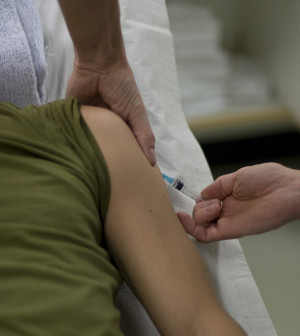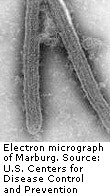- Could Artificial Sweeteners Be Aging the Brain Faster?
- Techniques for Soothing Your Nervous System
- Does the Water in Your House Smell Funny? Here’s Why
- Can a Daily Dose of Apple Cider Vinegar Actually Aid Weight Loss?
- 6 Health Beverages That Can Actually Spike Your Blood Sugar
- Treatment Options for Social Anxiety Disorder
- Understanding the Connection Between Anxiety and Depression
- How Daily Prunes Can Influence Cholesterol and Inflammation
- When to Take B12 for Better Absorption and Energy
- Epsom Salts: Health Benefits and Uses
Drug Might Fight Ebola-like Marburg Virus


Researchers say they’ve made preliminary progress toward developing a drug that one day may treat people infected with the deadly Marburg virus, which is similar to Ebola.
Monkeys didn’t die from Marburg virus after they were infected and then treated with the highest doses of the experimental drug. And healthy humans didn’t get sick when they got similar doses, the researchers reported.
“These results have allowed us to predict a dose that could be expected to protect humans exposed to Marburg virus,” said study author Dr. Alison Heald. She is a clinical associate professor with the division of allergy and infectious diseases at the University of Washington Medical Center, in Seattle.
The researchers emphasized that the drug is not a cure, and it’s not known whether it will protect humans or what it might cost.
Marburg virus gets less attention than the Ebola virus since far fewer cases have been recorded. Only 572 cases of Marburg virus have ever been reported, compared to more than 27,000 cases of Ebola in the current outbreak in Africa alone, said Heald. She formerly was senior director of clinical development at Sarepta Therapeutics, which assisted in testing the experimental medication.
But the two viruses are very similar, Heald said. Both are highly deadly and cause a devastating condition known as viral hemorrhagic fever that can lead to massive bleeding and organ failure.
“Based on the similarity of Marburg and Ebola viruses and lack of available treatment options,” Heald said, “it is certainly possible that Marburg virus could cause an outbreak of similar proportions to Ebola.”
There’s no specific treatment or vaccine for people infected with Marburg virus, which can be transmitted through contact with infected people.
The new drug, known as AVI-7288, does not prevent infection with Marburg virus. “Rather, it limits the replication of the virus, which in turn reduces the severity of disease once the virus is introduced into the body,” explained study co-author Travis Warren. He is a research scientist with the U.S. Army Medical Research Institute of Infectious Diseases, in Frederick, Md.
In 2014, researchers at the University of Texas Medical Branch at Galveston reported success with an experimental Marburg drug that works in a similar way.
With the new drug, scientists injected the drug into monkeys infected with the Marburg virus and found they developed fewer symptoms, with none dying among those who got the highest doses.
The scientists also reported no safety problems when they gave healthy people doses similar to those that seemed to work in monkeys.
If it’s ultimately used in the field, “AVI-7288 is mostly likely to be effective in treating those individuals who may have cared for or been exposed to someone infected with Marburg virus,” Heald said. “It is not always clear when someone has been exposed to Marburg virus, but high-risk individuals could be monitored for early symptoms such that treatments could be started as early as possible.”
Elke Muhlberger, an associate professor of microbiology who studies Marburg virus at Boston University School of Medicine, called the study findings “very exciting” and said the treatment could protect not only civilians but also health workers who may get infected through needle sticks.
But she cautioned that treating infected people may be challenging. When it comes to Ebola, she said, “People are afraid to go to the treatment units, and they only go when they are very ill.” It takes about a week for the Marburg virus to incubate in the body, she said. By then, it may be too late for this drug to work.
Alan Schmaljohn, a professor of microbiology and immunology at University of Maryland School of Medicine in Baltimore, said “the study is a step in the right direction” and “and a hopeful sign that the drug can be tested in humans exposed to the virus without killing the subject outright.”
The medication isn’t approved for use by the U.S. Food and Drug Administration. And, it’s not now under active development, said study co-author Dr. Michael Wong, senior medical director of infectious diseases at Sarepta Therapeutics, in Cambridge, Mass.
The study is published in the July 23 issue of The New England Journal of Medicine.
More information
For more about Marburg virus, visit the World Health Organization.
Source: HealthDay
Copyright © 2026 HealthDay. All rights reserved.










